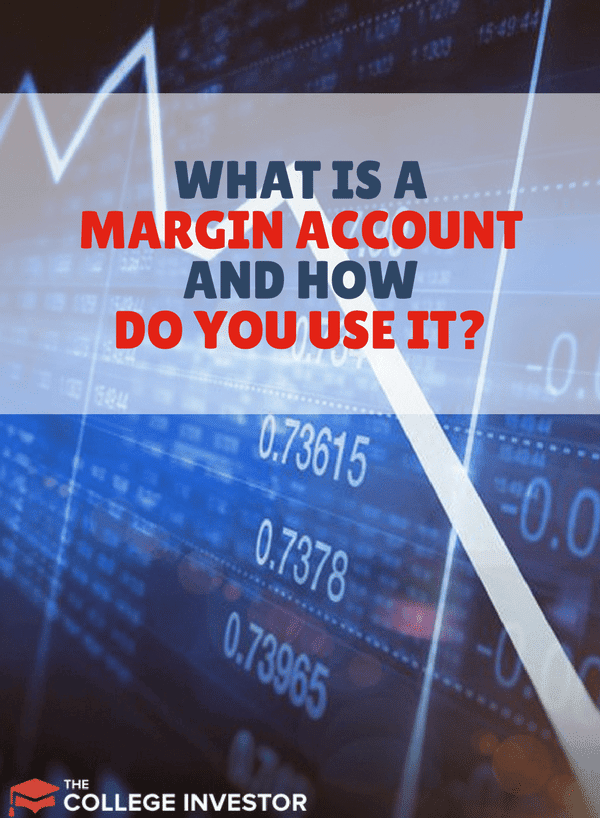
Have you ever been in a situation where you wanted to take advantage of a hot stock by buying more but didn’t have enough funds in your brokerage account?
Or have you ever want to short sell, trade options, or make other more complex trades?
That’s where a margin account comes in. In this article, we’ll learn what a margin account is and how to use it.
What Is A Margin Account?
Leverage allows you to use some of your money and amplify it by using other people’s money. A margin account is the vehicle that makes all of that happen.
To better under how this works, here’s an example of buying stock without a margin account:
Example 1: 100 shares of ABC @ $25/share = $2,500
When you use the margin available through a margin account, your broker will often provide funds for 50% of the shares. Now the transaction looks like this:
Example 2: 100 shares of ABC @ $25/share = $1,250
Where the other $1250 is borrowed from your broker. This means you can buy another $1,250 worth of a different stock, thus leveraging your original $2,500 into $5,000.
The additional $2,500 provided by the broker is called margin buying power. The total $5,000 is your total buying power. You can purchase stock up to that amount. Your original $2,500 is called cash buying power.
In the above example, ABC has a 50% margin requirement. Whatever your total value for the amount of stock that you want to purchase is ($5000 in our example), you’ll need half of that amount.
If the margin requirement is 75%, you’ll need $3,750 of your money and the broker will provide the other $1,250.
Besides stocks, margin accounts allow you to trade various option strategies. Option enabled accounts have different levels of approval. These go from levels one to four. Level 4 is the most difficult to get approved for because it involves risky strategies such as selling naked put options.
Margin Is A Loan
From the above examples, you’ve probably guessed the broker is loaning you money. Does this mean there are fees and interest?
Yes, but it is usually only interest. The interest rate decreases as your account value increases. Using an example from E*TRADE, you can see the margin interest rates here.
The highest rate is assessed on accounts of $10,000 or less at 10%. With larger accounts, the rate continues to drop until the account value reaches $1,000,000, where rate drops to 6.50%.
Brokerages will usually deduct the interest fee directly from your account balance each month. This transaction will show up in your transactions view and statements.
Opening A Margin Account
You must explicitly request to open a margin account. Otherwise, you will probably default to a cash account.
The difference with a cash account is that you have to use your full cash amount when purchasing stock. That’s our “Example 1” from above.
Most retirement accounts are cash accounts. Although, you can request to have a margin brokerage account added as one of your retirement accounts.
When filling out a margin account application, you will fill in your personal and financial details. There will be questions about your trading history.
Once the account is approved, you’ll get a notification. But until then, you may not be able to trade on margin. Most people get approved easily and sometimes immediately.
Related: Where To Find The Best Margin Rates
Be Careful Of Margin Calls
As the value of your stocks moves up and down, so does the value of your account. If you use only a cash account, the value of your account equals the value of your stocks plus any cash balance.
With margin, this is not the case since you can basically have a value above your account value. Here’s how it works:
You deposit $5,000 into your margin account. The broker makes $5,000 available to you, increasing your total buying power to $10,000.
You buy $9,000 worth of stock, leaving $1000 of buying power available. The stock happens to be volatile and after a week has dropped in value to $8,200.
The broker increases the margin requirement on the stock from 50% to 75% because of its volatility. Yes - a broker can do this.
Instead of needing to put up $4,500 for the stock, you must put up $6750. But you only have $5,000. What happens now?
The broker will request the additional $1,750. This is a type of margin call. You will have about five days to come up with the additional cash.
There are a few ways to satisfy the margin call. You can sell out of your position, taking a loss. Or you can deposit money into your account from your banking account.
Keep in mind that if you sell out, your losses will be amplified because you are leveraged. Margin is definitely a two-way sword.
Conclusion
When used carefully, margin can be a great tool for taking advantage of market opportunities.
Leaving enough cash in your account so you can handle fluctuations will help to avoid margin calls. Also, staying away from risky stocks will minimize fluctuations in your account.
Keep in mind that using margin does cost. If you aren’t watching it, you can rack up a few hundred dollars per month just in margin interest fees.
Do you have a margin account?

Robert Farrington is America’s Millennial Money Expert® and America’s Student Loan Debt Expert™, and the founder of The College Investor, a personal finance site dedicated to helping millennials escape student loan debt to start investing and building wealth for the future. You can learn more about him on the About Page or on his personal site RobertFarrington.com.
He regularly writes about investing, student loan debt, and general personal finance topics geared toward anyone wanting to earn more, get out of debt, and start building wealth for the future.
He has been quoted in major publications, including the New York Times, Wall Street Journal, Washington Post, ABC, NBC, Today, and more. He is also a regular contributor to Forbes.
Editor: Clint Proctor Reviewed by: Chris Muller
